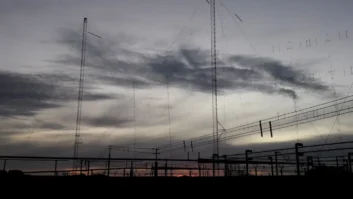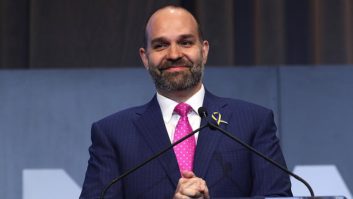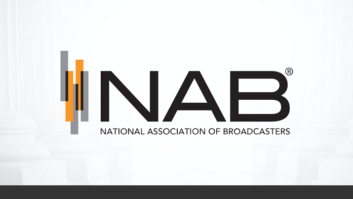
Kelly Orchard reviews public file at at KTLA(TV) in Los Angeles.The author is an FCC compliance specialist with Orchard Media Services Inc.
I began my journey into FCC compliance consulting in 1999 when I left the world of advertising sales for CBS Radio in Sacramento.
It is a pleasure to work in the nitty gritty field with the backend of the broadcast business; and colleagues, owners and attorneys claim that what we do to help stations with their FCC compliance requirements is “The Lord’s work.”
I like to joke that we are the morticians of broadcasting; we do the job that must be done, although nobody really enjoys doing it.
I can’t tell you how many transmitter sites I have visited. My dad, Ken Orchard, is my business partner and an engineer. He worked as an engineer in Los Angeles, first for RKO General at KHJ when AM was dominant and FM was evolving; later, he was part of the teams that helped to build up KRTH(FM) in the early ’70s. I’m grew up visiting radio stations while we travelled around the country in an RV on summer vacation.
My dad didn’t just acquire radio stations; he built five, including an FM in Bakersfield named after me.
We owned and operated the statiions, so my background consists of the entire process. I’ve found an available frequency, gone through the FCC application process, conducted ascertainments of the community to be served, endured the process of competitors also applying for the same license, and once the construction permit was assigned, I experienced the actual facility construction — including going to the NAB Show to purchase equipment and the other assets necessary to build a station.
Becoming a consultant was the next step.
NO APPOINTMENT NEEDED
In 1999, we were consulting for a group of stations in southern California, and the staff was curious as to the condition of the public files of a competitor. This is a very common mindset; everybody wants to know how the competition measures up.
Anybody can walk into the lobby of a broadcast station and ask to see the public file, so that is exactly what I did: I drove over and asked to see the public file.
(If you are having trouble getting an appointment with the GM of a station — just walk in and ask to see the public file. you are practically guaranteed that the GM will make an appearance, at least in the small- to mid-sized markets.)
The reaction prompted me to study how stations were doing with their public files during the early years of consolidation, and the results were eye-opening. Since then, I have conducted alternative broadcast inspections for hundreds of radio and television stations.
There isn’t really a consistent job description or title for the public file custodian. I’ve seen everyone from the owner to the janitor in charge of the public files and FCC compliance plan!
The truth is that the FCC compliance department at a radio station — no matter the market size — could be just about anybody. And that is really dangerous.
It’s not only surprise FCC inspections that you should be worried about. Sometimes a political candidate will want to see how you are handling an opponent’s ad campaign. Or an organization might complain about a program or a contest that you ran. These can then prompt an investigation.
There may also be disgruntled employees. If someone knows your station might not be keeping all the documentation, logs and reports in an orderly and timely manner, he or she might file a complaint with the FCC.
INSURANCE
What can you do?
The Alternative Broadcast Inspection Program is a great insurance policy. All the state associations offer ABIP, and they will check that you meet your FCC requirements with engineering, safety and that your public files are in order. The FCC gets notified that your station is participating in the program, and it provides you with an unbiased inspector who will conduct a mock inspection. He or she will give you a report on should be resolved to ensure compliance, and then you’ll get a certificate of compliance, and the FCC also gets notified that you are in possession of the certificate.
The FCC agrees that it will not conduct a surprise inspection on your station for a three-year period. There are some caveats; talk to your state association about it, or feel free to contact me if you have questions.

CBS Radio Los Angeles’ Chief Engineer Lynn Duke and Ken Orchard in the KRTH(FM) studio. I’m an inspector with an independent contract with the FCC, with the authority to conduct inspections outside of state associations. If you don’t belong to a state association, you can call me, or if you own stations in multiple states but prefer to utilize just one inspector, we can do that for you.
The FCC is in the process of implementing the online public file for radio stations, just like they have done for television. We’ve conducted some inspections of the online files, and yes, there are improvements that can be made to the process. But for the most part, stations find it easy and convenient, and they appreciate that having a paper file won’t be necessary. Although that, too, is subject to stations’ discretion: some still choose to maintain a physical file, while others have eliminated theirs.
The truth is that every station has its own method to manage compliance. There is no cookie cutter plan, and that is part of the challenge. Orchard Media Services often picks up clients who simply want to outsource to us because they have nobody who knows the rules or understands why they must maintain a public file (or what one is).
When the sales manager or news director, or program director or receptionist is given the assignment of maintaining the “FCC Report,” fear is often the first response, and then frenzy. Often, all they do is continue what the person before them did.
IT ADDS UP
Most public file violations are for “missing documentation.” That is a $4,000 fine. Occasionally, we come across stations that engage in our services and don’t have a public file at all. That’s a $10,000 fine. Imagine how quickly the fines would add up.
Here is a question we frequently ask our clients: “Who is the one person at your station who knows all about the compliance of your station?”
We usually hear crickets.
The engineers don’t really have an understanding of what goes into the quarterly issues and programming reports; the sales manager doesn’t really know what logs need to be kept for EAS or transmitter calibrations.
The number one job of the general manager is to protect the license. The second, at a commercial station, is to increase revenue.
The standard path to becoming a GM is usually through the sales department. GMs often don’t know what they need to know, until they need to know it, and then they need to delegate the task to someone who probably knows less than they do.
There are exceptions. We’ve inspected stations that have a good grasp on their compliance efforts. Those are usually ones where the same individual has been with the station for years. Those with a tremendous amount of ownership and management changes, turnover and layoffs are usually most vulnerable.
I recommend you contact your state association and participate in the ABIP. I can help you get started.
Also, the FCC has a “self-inspection” checklist. Find it here:http://www.fcc.gov/encyclopedia/broadcast-self-inspection-checklists.
You can view the rules of the public inspection file at http://transition.fcc.gov/eb/broadcast/pif.html.
You have to have a license to broadcast. It doesn’t matter who owns it, what the format is, what market size, revenue share or who the competition is.
This is where the playing field is leveled.
Get some insurance. Don’t let not following the rules cause you to be cited. Even if they don’t issue a fine, the nuisance of responding still takes its toll on you — and you have better things to do with your time.
Email Kelly Orchard at [email protected].












